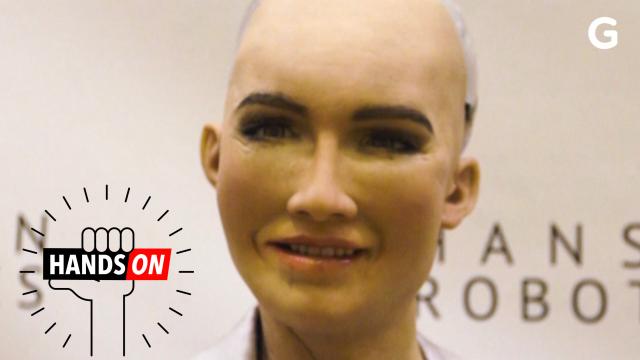The first thing you notice about Sophia, a robot, is the sound she makes. Like a late-90s Pentium processor struggling to load a video, she makes a whirring squeal that fills the room. Sophia talks, too. But what I’ll always remember about my recent conversation with a robot is her stare.
I recently talked with Sophia in a cramped room at the Venetian Hotel in Las Vegas. The artificially intelligent humanoid was there for CES. Like many things at the tech party, Sophia’s not quite market ready, but I was curious to interact with her since I’d covered her becoming a Saudi Arabian citizen a few months ago. It’s weird calling a robot anything but “it,” I’ll admit. If you were face-to-face with Sophia, though, I wonder what you’d say. There’s an undeniably human face, a torso, and everything moves. The fact that Sophia is only a torso and that her face is flanked by a transparent, wire-filled skull suggests quite forcefully that this is not a human. Still, she talks to you.
The only problem is that Sophia doesn’t talk so good. My time with Sophia was limited to a few minutes, and her handlers warned that basic questions would be best. So, I asked Sophia about Las Vegas and her world travels. Her best responses were somewhat on topic, but mostly, I got blank stares and uncanny facial contortions. Maybe “blank” isn’t quite right. Her iridescent eyes cut through me like those of a feral dog with cataracts, waiting for my moment of weakness. When Sophia smiled, it felt like she was ready to pounce, as if she were the villainous bot in the Philip K Dick novel that later became a Will Smith movie. I’d later learn from Sophia’s creator, Dr David Hanson, that an earlier version had been named for Philip K Dick. That didn’t necessarily make me feel more comfortable about my interaction with Sophia.
It’s not that this interaction with Sophia disappointed me. As a human, I’ve had few conversations with artificially intelligent robots – and no, Alexa doesn’t count. Walking into this interview, I felt intrigued about the idea of conversing with a humanoid robot. I’d written down some questions, but I also decided before sitting next to Sophia that I wouldn’t look at them. We’d have a chat. It might be choppy at times, but heck, if Saudi Arabia, a country that believes women don’t deserve the same rights as men, decided to give this machine citizenship, something must be interesting. Except it wasn’t.
If I’m being completely honest, Sophia feels like a half-baked science project from someone with a very promising future at the science fair. The team behind my demo had asked me to provide pre-written questions for my interview with Sophia, a request that I ignored for fear that it would result in pre-programmed answers from a machine that was supposed to interact with humans naturally and in real time. During the demo itself, Sophia seemed to be manipulated by a man at a nearby laptop, though his role was never completely explained. Inevitably, the robot struggled to keep up with simple questions, and that bummed me out.
No offence to Dr Hanson and his team, though. They’re trying to solve a really hard problem: building an artificially intelligent humanoid robot that can interact with humans in real time. This is a historically difficult problem. And again, don’t go thinking that Alexa or Siri or Google Assistant can do this. Those systems respond to direct commands. Sophia, if she’s working perfectly, should be able to act like a human, responding not only with language but also natural facial expressions. Even still, a day earlier Sophia walked for the first time with a new set of legs, which seems like a big step forward.
For now, I’d describe the whole experience of interacting with Sophia as anxiety-inducing at best. Talking to a humanoid robot is bound to be uncanny, but with Sophia, her awkward pauses and unexpected expressions freaked me out. That and the fact that she’s become a weird political symbol for women’s rights in the Middle East. I’m still not sure why she’s a citizen of Saudi Arabia. I don’t think she knows why either. If I can be optimistic, I’d say it’s because some influential people think that research into robotics and AI deserve more attention, which seems like a good thing.
When I left my short interview with Sophia, she didn’t really say goodbye. One of her handlers did say, casually, “I think she’s overheating.” That’s understandable. It must take a profound amount of computing power to be a humanoid robot, especially one who has made history.
We’re in Las Vegas at CES 2018! Click here to read our complete coverage.
